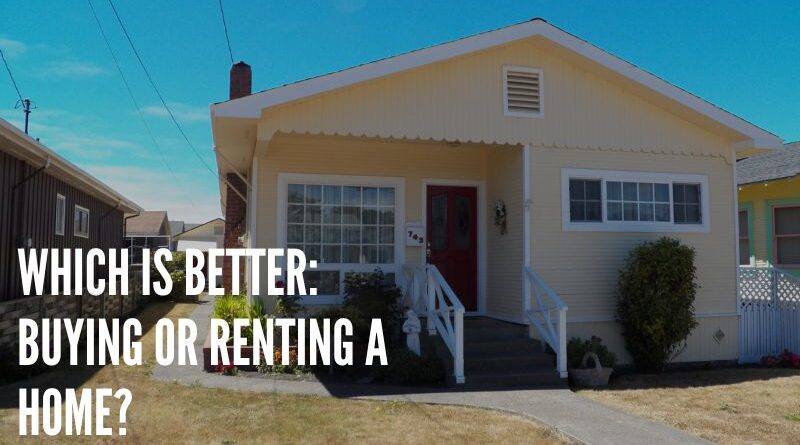Which Is Better: Buying or Renting a Home?
The decision to buy or rent a home is a significant life choice that can have a profound impact on one’s financial stability, lifestyle, and long-term goals. Both options come with their own set of advantages and drawbacks, making it crucial for individuals to carefully consider their personal circumstances before making this important decision. In this article, we will delve into the key factors that should be taken into account when weighing the pros and cons of buying versus renting a home.
Financial Considerations
One of the primary factors influencing the decision between buying and renting is the financial aspect. Buying a home typically involves a substantial upfront investment, including a down payment, closing costs, and various fees. Additionally, homeowners bear the responsibility of ongoing mortgage payments, property taxes, homeowners insurance, and maintenance expenses.
On the other hand, renting usually requires a smaller initial financial commitment. Renters are generally responsible for monthly rent payments and, in some cases, utilities. This lower upfront cost can be advantageous for those who may not have significant savings or prefer not to tie up their funds in a property.
Weighing the long-term financial implications is crucial when deciding between buying and renting. While homeownership builds equity over time and offers potential appreciation in property value, it also comes with the risk of market fluctuations and the potential burden of unforeseen maintenance costs. Renters, on the other hand, may not build equity, but they also avoid the financial risks associated with homeownership.
Flexibility and Mobility
Another critical factor to consider is the level of flexibility and mobility that each option provides. Renting is often favored by individuals who prioritize flexibility in their living arrangements. Renters can easily relocate at the end of their lease, which is typically one year, without the complications of selling a property. This flexibility is especially beneficial for those who anticipate changes in their job, lifestyle, or family circumstances.
Homeownership, on the other hand, ties individuals to a specific location for a more extended period. Selling a home can be a time-consuming and complex process, and market conditions may affect the speed and profitability of the sale. Homeowners might find it challenging to adapt to unexpected changes or opportunities that require relocation.
Building Equity and Wealth
One of the primary advantages of homeownership is the potential for building equity and wealth over time. As homeowners pay down their mortgage, they increase their ownership stake in the property. Additionally, real estate has historically shown appreciation over the long term, providing homeowners with the opportunity to accumulate wealth through property value appreciation.
Renters, on the other hand, do not build equity through monthly payments. While renting provides a place to live, the financial benefits are generally limited to the flexibility and lower initial costs associated with renting. Renters miss out on the potential long-term wealth-building aspect that comes with homeownership.
Market Conditions and Homeownership Trends
The decision between buying and renting can also be influenced by current market conditions and homeownership trends. In a buyer’s market, where there is a surplus of homes for sale and prices are more competitive, purchasing a home may be a more attractive option. In contrast, a seller’s market, with high demand and limited inventory, could make buying a more challenging and expensive endeavor.
Additionally, cultural and generational trends play a role in shaping attitudes toward homeownership. Some individuals and generations may prioritize the stability and sense of achievement that comes with owning a home, while others may value the flexibility and lower commitment associated with renting.

Tax Implications
Tax considerations are another aspect that can impact the decision-making process. Homeownership often comes with tax advantages, such as deductions for mortgage interest, property taxes, and certain home-related expenses. These deductions can result in significant savings for homeowners, making the overall cost of homeownership more manageable.
Renters, however, do not benefit from these tax advantages. While they may have a more straightforward monthly financial commitment, they miss out on potential tax benefits that could contribute to overall financial well-being.
Read Also: What Impact will AI have on Real Estate Investing?
Conclusion
The decision to buy or rent a home is a complex and deeply personal choice that depends on various factors, including financial readiness, lifestyle preferences, and long-term goals. Each option comes with its own set of advantages and drawbacks, and there is no one-size-fits-all answer.
Individuals must carefully assess their financial situation, consider their mobility needs, and weigh the potential benefits of homeownership against the flexibility of renting. Moreover, staying informed about current market conditions, tax implications, and cultural trends can aid in making a well-informed decision.
Ultimately, whether buying or renting is the better choice depends on the unique circumstances of each individual or family. By thoroughly evaluating the key factors and seeking professional advice if needed, individuals can make a decision that aligns with their goals and sets the foundation for a secure and fulfilling living situation.



